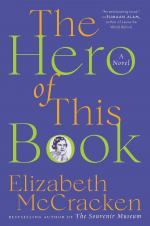|
This section contains 582 words (approx. 2 pages at 400 words per page) |

|
Hero of This Book Summary & Study Guide Description
Hero of This Book Summary & Study Guide includes comprehensive information and analysis to help you understand the book. This study guide contains the following sections:
This detailed literature summary also contains Quotes and a Free Quiz on Hero of This Book by Elizabeth McCracken.
The following version of this book was used to create the guide: McCracken, Elizabeth. The Hero of This Book. HarperCollins Publishers, 2022.
Elizabeth McCracken's novel The Hero of This Book follows an unnamed first person narrator's ventures throughout London on a single day. In spite of the deceptively simple narrative premise, the novel toys with conventional notions of plot, structure, and point of view throughout. The following summary adheres to a more streamlined mode of explanation and relies upon the present tense.
Ten months after her mother dies, the narrator takes a trip to London by herself. On her first night, she sits in her hotel room and browses the internet. She tries to keep herself from looking at pictures of her parents' house, which has recently gone on the market. She decides that tomorrow, she will spend the entire day out.
The next day, the narrator wanders aimlessly around the London streets. She is unaccustomed to traveling in this unplanned way. The last time she was in London, she and her mother were together. While walking, she tries to keep herself from thinking of her parents and their house. It was always filled with junk, collectibles, and cats. The narrator once hoped they would sell the house and move out, but they never did. She is glad that she will soon be rid of it.
The narrator walks down to the Thames. She studies the people searching for treasures washed up in the mud. Afterwards, the narrator rides a glass elevator called the Millennium Inclinator. She feels invisible although the car is transparent. When she gets off, a little girl asks her name. The narrator insists she has no name. Afterwards, she crosses the Millennium Bridge. She feels irritated by the tourists taking pictures, realizing she no longer has a purpose.
The narrator takes a ride on the London Eye. She shares the car with a family celebrating their great-grandmother's birthday. Looking out at the city, the narrator regrets never taking her mother on the Eye. She had not known her mother would have been able to drive her motorized scooter onto the ferris wheel. She wonders if her regret and guilt are in fact grief.
The narrator goes to Tate Modern and has a glass of wine at the museum café. Sitting by the window, she realizes how much her mother would have enjoyed the experience.
Throughout the remainder of the day, more and more memories of her mother surface in her mind. She recalls her mother's tiny feet. She thinks about her mother's dark, unruly hair. She remembers all of the times that her mother fell, deeming it one of her best talents. Everywhere the narrator goes, she can imagine her mother next to her.
At the end of the day, the narrator goes to see A Midsummer Night's Dream at the Bridge Theatre. She is particularly moved by the scene in which Puck jumps from the stage and disappears.
When her mother got sick, the narrator sat by her bed, desperate for her to wake up. Because her mother had recovered from other illnesses, falls, and surgeries, the narrator was convinced she would soon open her eyes. When the doctor showed her the brain scans, however, the narrator knew her mother was not getting better.
The narrator has written this account about her mother to keep her from disappearing forever. She has been reluctant to admit it, and hopes that her mother would not disapprove.
Read more from the Study Guide
|
This section contains 582 words (approx. 2 pages at 400 words per page) |

|



